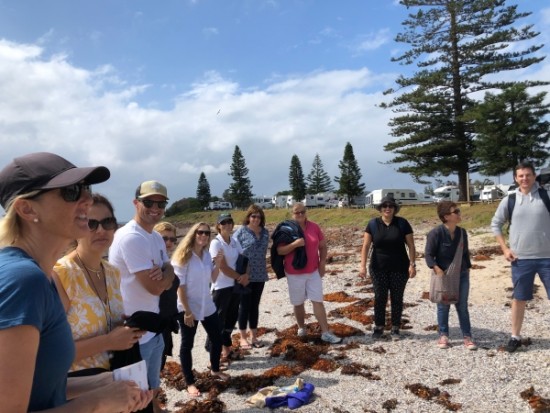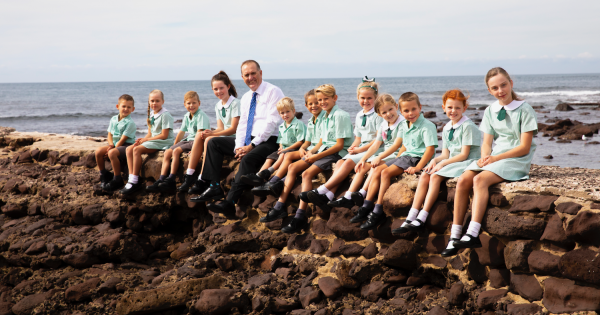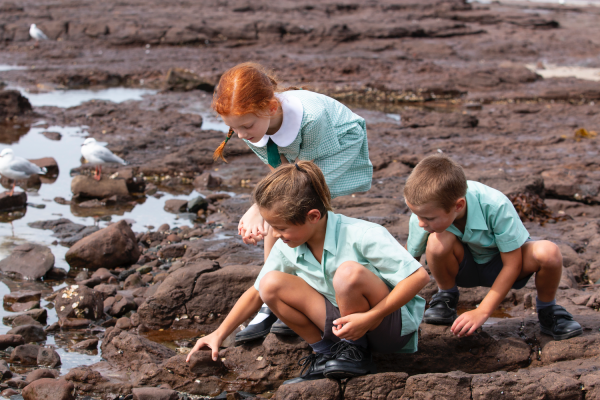Making the most of the beautiful natural environment around us: Stella Maris embraces outdoor learning
 A gentle sea breeze and the feeling of the sand between your toes; you look up to the warmth of the sun, hear the seagulls above and see the water lapping onto the rocks nearby. This experience of nature could be mistaken as a break far away from the classroom, but this is the future for students’ Science, Maths, English and Geography lessons at Stella Maris Catholic Primary School, Shellharbour.
A gentle sea breeze and the feeling of the sand between your toes; you look up to the warmth of the sun, hear the seagulls above and see the water lapping onto the rocks nearby. This experience of nature could be mistaken as a break far away from the classroom, but this is the future for students’ Science, Maths, English and Geography lessons at Stella Maris Catholic Primary School, Shellharbour.
Our school is set to incorporate outdoor learning into a typical school day for their classes – an innovative approach to teaching an integrated curriculum and, quite literally, a breath of fresh air that will benefit students academically, physically, mentally, socially and emotionally.
Our team of staff have participated in NESA-accredited professional development and learning about outdoor education from leading researcher in the space, Dr Amanda Lloyd, who helped empower them to use nature pedagogy in their programs and explore several elements of the NSW syllabus in an outdoor context.
They've engaged in workshops involving a combination of both theory and practice, with a majority of the time spent outside discovering how playgrounds and outdoor environments can be not only sites of knowledge and understanding, but even enhance learning across several Key Learning Areas (KLAs).
Just as they will do with their students, the teachers enjoyed the serenity of the nearby rock pools of Shellharbour Harbour while engaging in outdoor learning activities such as sensory games using natural materials for Geography; demonstrating mapping and mathematics concepts by tracing them into the sand; and sourcing coloured materials from the environment and matching paint samples to it for Visual Arts.
Dr Lloyd also demonstrated how easily IT and STEAM (Science, Technology, Engineering, the Arts and Mathematics) education can be incorporated to further supplement nature-based experiences and skills development within everyday teaching, such as through iPad technologies and apps for photography, content creation, coding and mapping.
Principal, Danny Sykes, said outdoor learning was important to teach students that learning can take place at any time, at any place and across all KLAs.
"Stella Maris is fortunate to have numerous natural resources at our doorstep, which lends itself to the inclusion of outdoor education into the school curriculum. Using the local environment as a learning focus will increase engagement and motivation among our students – an outcome we are actively seeking here at Stella Maris" — Danny Sykes, Principal

Kindergarten teacher, Elise Thompson, said Dr Lloyd used her academic research and own experience as a teacher to provide the Stella Maris staff with some fantastic insights into outdoor learning and its advantages.
“Our facilitator supported the outdoor learning pedagogy with data evidencing successful results across a range of subjects, and provided practical professional advice, such as around developing risk assessments,” Ms Thompson said.
"Throughout the day, Dr Lloyd shared with us many valuable ideas for hands-on activities that could be used in teaching programs for all year levels, and encouraged us all to consider how we could incorporate more outdoor learning into our current teaching practices" — Elise Thompson, Stella Maris teacher
“As an Early Stage One teacher, I was shown several teaching activities linking not only to my Science and Digital Technologies programs, but also to my Geography unit, ‘People Live in Places’.”
A strong advocate of moving away from desks and whiteboards, Dr Lloyd, said facilitating the day was important to provide the staff with practical skills on how to teach routine lessons outside the classroom and successfully integrate the approach into Science, English and Mathematics activities in particular.
"For most children, the majority of time at school is spent inside a classroom sitting at a desk. It doesn’t have to be this way. Beyond the classroom there is a whole world waiting to be explored. Schools just need to access it. When an integrated learning program is developed by teachers and supported by schools, we position children to learn in, with and for nature" — Dr Amanda Lloyd, leading researcher on outdoor learning
“Outdoor learning has immense benefits for children across the academic, social and wellbeing domains. Once outdoor learning routines are established, children are often more engaged on exploration tasks and ready to transfer their learning back to the classroom,” she said.
“As a Catholic system, we are in a unique position to include outdoor and environmental lessons in creation, too. Connecting children to the places surrounding their school gives them knowledge of a place and how to look after it into the future, creating the environmental stewards of their local area well into the future.”
Dr Lloyd commended the Stella Maris staff on their openness to the concept of outdoor education and their keen willingness to adopt the practice for the benefit of their students.
“The staff at Stella Maris were enthusiastic participants, interested in working out how the rock platform and natural environment close to their school could link to the curriculum, particularly in Science. Staff tested the science equipment they bought in preparation for their classes, and were able to experience the fun, play and enjoyment of the rock platform themselves.
"Seeing that fun, immersion and the curriculum can all go hand in hand was a great take home message for the teachers.”
The Stella Maris staff have come away feeling energised, confident and full of ideas to think outside the box of the classroom and incorporate nature across many lessons and subjects.
The school already has many exciting plans in the pipeline for this year: a plastic pollution incursion with waste audit; the hiring of a ‘museum in a box’ from the Australian Museum; and learning about rock pool and marine life conservation with marine biologists and other local specialists from the Shellharbour City Council. Watch this (outdoor) space!

OUTDOOR LEARNING - WHAT ARE THE BENEFITS?
Outdoor learning was added to the Australian National Curriculum in 2015. It has been found to improve students' performance in class tests as well as their mental and physical health, resilience, critical thinking and problem solving skills, according to a 2017 report by Planet Ark based on local and international research.
An array of research from Australia and around the world further shows how nature contact and more time outdoors helps children live healthier, happier and more connected lives. The benefits of outdoor learning reach beyond the curriculum to develop better cognitive functioning, psychological wellbeing, self-confidence, self-control and risk awareness. It has also been found to develop heightened emotional intelligence, interpersonal and social skills, leadership skills, and imaginative play capabilities.
Dr Lloyd’s own experience of integrating outdoor learning into her teaching at St Mary’s Star of the Sea, Milton saw her students’ academic results markedly improve: she observed their learning “expand dramatically”, every child increase their vocabulary and writing ability noticeably, and their reading skills improve well above the normal level.
“The students were much more motivated to learn, especially because everything they did involved real life examples and tangible events. Some children who were reluctant writers, recorded their experiences readily after the stimulation outdoors,” she said.
“They also connected differently with each other. Outdoor learning transformed friendships between the students. Some students who had been shy and quiet indoors became leaders outside.”
Dr Lloyd said the practice developed the children’s affiliation with other species and the natural world. “The outdoor learning and sense of place has now become a part of who they are.”
